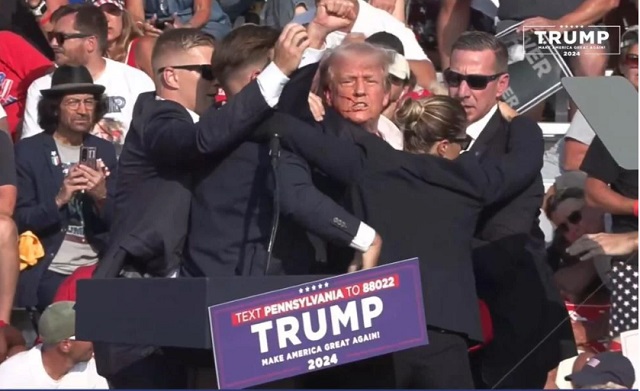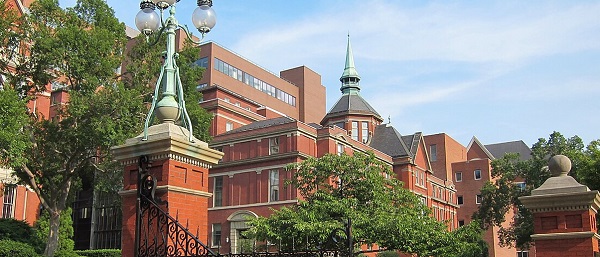International
Oversight committee investigates alleged Google censorship of Trump shooting

From The Center Square
By Casey Harper
U.S. House Oversight Chair Rep. James Comer, R-Ky., launched an investigation Wednesday into allegations that Google and Meta, formerly known as Facebook, censored or misrepresented content about President Donald Trump and Vice President Kamala Harris.
Comer sent letters to Meta CEO Mark Zuckerberg and Google CEO Sundar Pichai Wednesday over the alleged censorship, which grabbed national attention after the near-fatal assassination attempt against Trump in Butler County, Pennsylvania July 13.
How Google and Facebook handled questions and searches about the assassination attempt against Trump sparked criticism.
“Specifically, Meta’s AI assistant claimed, ‘the attempted assassination of former President Donald Trump was a ‘fictional’ event,’ even as the chatbot ‘had plenty to say about Democratic rival Kamala Harris’ run for the White House,” Comer wrote, citing a New York Post article. “When asked if the assassination on President Trump was fictional, Meta’s bot responded that there ‘was no real assassination attempt on Donald Trump. I strive to provide accurate and reliable information, but sometimes mistakes can occur.’ The bot further added, ‘[t]o confirm, there has been no credible report or evidence of a successful or attempted assassination of Donald Trump.’”
Facebook’s team also admitted that it censored the photo of a bloody Trump holding his fist in the air just after the shooting, a photo that went viral online and became a rallying point for his campaign.
“This was an error,” Facebook Communications Director Dani Levi wrote on X about the photo. “This fact check was initially applied to a doctored photo showing the secret service agents smiling, and in some cases our systems incorrectly applied that fact check to the real photo. This has been fixed and we apologize for the mistake.”
“Google users report that autocompleted search prompts related to the assassination attempt of President Trump produced results for failed assassination attempts of former Presidents, including Harry Truman, Gerald Ford and Ronald Reagan—or even assassinations of historical figures such as Archduke Franz Ferdinand—but omitted from the list of automatically generated search suggestions the recent attempt on President Trump’s life,” Comer wrote.
Google told CBS MoneyWatch that the search issues were technical “anomalies” that were unintentional and could affect anyone.
Comer’s investigation is calling for documents and answers on how Google’s search and autocomplete works. Google staff briefed the committee earlier this month.
“In response to preliminary staff inquiries, Google contends that the Autocomplete results omitted the Trump assassination attempt due to a safety protocol concerning predicted assassination attempts of current political leaders, and Google had not yet updated the Autocomplete feature to reflect that an assassination attempt of President Trump had occurred,” Comer wrote.
In his letter to Mark Zuckerberg, CEO of Meta, formerly known as Facebook, Comer pointed out that the executive branch regulates the tech companies that can have bias in determining who runs the executive branch.
“The Committee has long been concerned with how large technology companies leverage their businesses to influence public opinion—especially the design and use of content moderation policies within private sector social media companies—and how company policies are shaped and influenced by Executive Branch officials,” Comer wrote in his letter to Zuckerberg.
After the issues last month, Trump blasted both companies online, saying “here we go again” and calling it “rigging the election,” an apparent reference to how social media companies at the urging of the FBI censored news stories about the Hunter Biden laptop as Russian disinformation but the laptop later was found to be real.
Casey Harper
D.C. Bureau Reporter
Business
Will Paramount turn the tide of legacy media and entertainment?


From the Daily Caller News Foundation
The recent leadership changes at Paramount Skydance suggest that the company may finally be ready to correct course after years of ideological drift, cultural activism posing as programming, and a pattern of self-inflicted financial and reputational damage.
Nowhere was this problem more visible than at CBS News, which for years operated as one of the most partisan and combative news organizations. Let’s be honest, CBS was the worst of an already left biased industry that stopped at nothing to censor conservatives. The network seemed committed to the idea that its viewers needed to be guided, corrected, or morally shaped by its editorial decisions.
This culminated in the CBS and 60 Minutes segment with Kamala Harris that was so heavily manipulated and so structurally misleading that it triggered widespread backlash and ultimately forced Paramount to settle a $16 million dispute with Donald Trump. That was not merely a legal or contractual problem. It was an institutional failure that demonstrated the degree to which political advocacy had overtaken journalistic integrity.
Dear Readers:
As a nonprofit, we are dependent on the generosity of our readers.
Please consider making a small donation of any amount here.
Thank you!
For many longtime viewers across the political spectrum, that episode represented a clear breaking point. It became impossible to argue that CBS News was simply leaning left. It was operating with a mission orientation that prioritized shaping narratives rather than reporting truth. As a result, trust collapsed. Many of us who once had long-term professional, commercial, or intellectual ties to Paramount and CBS walked away.
David Ellison’s acquisition of Paramount marks the most consequential change to the studio’s identity in a generation. Ellison is not anchored to the old Hollywood ecosystem where cultural signaling and activist messaging were considered more important than story, audience appeal, or shareholder value.
His professional history in film and strategic business management suggests an approach grounded in commercial performance, audience trust, and brand rebuilding rather than ideological identity. That shift matters because Paramount has spent years creating content and news coverage that seemed designed to provoke or instruct viewers rather than entertain or inform them. It was an approach that drained goodwill, eroded market share, and drove entire segments of the viewing public elsewhere.
The appointment of Bari Weiss as the new chief editor of CBS News is so significant. Weiss has built her reputation on rejecting ideological conformity imposed from either side. She has consistently spoken out against antisemitism and the moral disorientation that emerges when institutions prioritize political messaging over honesty.
Her brand centers on the belief that journalism should clarify rather than obscure. During President Trump’s recent 60 Minutes interview, he praised Weiss as a “great person” and credited her with helping restore integrity and editorial seriousness inside CBS. That moment signaled something important. Paramount is no longer simply rearranging executives. It is rethinking identity.
The appointment of Makan Delrahim as Chief Legal Officer was an early indicator. Delrahim’s background at the Department of Justice, where he led antitrust enforcement, signals seriousness about governance, compliance, and restoring institutional discipline.
But the deeper and more meaningful shift is occurring at the ownership and editorial levels, where the most politically charged parts of Paramount’s portfolio may finally be shedding the habits that alienated millions of viewers.The transformation will not be immediate. Institutions develop habits, internal cultures, and incentive structures that resist correction. There will be internal opposition, particularly from staff and producers who benefited from the ideological culture that defined CBS News in recent years.
There will be critics in Hollywood who see any shift toward balance as a threat to their influence. And there will be outside voices who will insist that any move away from their preferred political posture is regression.
But genuine reform never begins with instant consensus. It begins with leadership willing to be clear about the mission.
Paramount has the opportunity to reclaim what once made it extraordinary. Not as a symbol. Not as a message distribution vehicle. But as a studio that understands that good storytelling and credible reporting are not partisan aims. They are universal aims. Entertainment succeeds when it connects with audiences rather than instructing them. Journalism succeeds when it pursues truth rather than victory.
In an era when audiences have more viewing choices than at any time in history, trust is an economic asset. Viewers are sophisticated. They recognize when they are being lectured rather than engaged. They know when editorial goals are political rather than informational. And they are willing to reward any institution that treats them with respect.
There is now reason to believe Paramount understands this. The leadership is changing. The tone is changing. The incentives are being reassessed.
It is not the final outcome. But it is a real beginning. As the great Winston Churchill once said; “Now this is not the end. It is not even the beginning of the end. But it is, perhaps, the end of the beginning”.
For the first time in a long time, the door to cultural realignment in legacy media is open. And Paramount is standing at the threshold and has the capability to become a market leader once again. If Paramount acts, the industry will follow.
Bill Flaig and Tom Carter are the Co-Founders of The American Conservatives Values ETF, Ticker Symbol ACVF traded on the New York Stock Exchange. Ticker Symbol ACVF
Learn more at www.InvestConservative.com
Education
Johns Hopkins University Announces Free Tuition For Most Students


From the Daily Caller News Foundation
Johns Hopkins University (JHU) announced on Thursday it is making tuition free for families earning less than $200,000 and will waive both tuition and living expenses for those making less than $100,000.
The university stated that “a majority of American families” will qualify for the fee exemption, allowing most students to attend without contributing a single dollar. The decision is meant to help recruit “the best and brightest students to Johns Hopkins irrespective of their financial wherewithal.”
“Trying to understand financial aid offers can be overwhelming,” David Phillips, vice provost for admissions and financial aid at JHU, said in the announcement. “A big goal here is to simplify the process. We especially want to reach students and families from disadvantaged backgrounds, rural locations, and small towns across America who may not know that a Hopkins degree is within reach.”
Dear Readers:
As a nonprofit, we are dependent on the generosity of our readers.
Please consider making a small donation of any amount here.
Thank you!
In 2018, Michael Bloomberg donated nearly $2 billion to the university, the largest ever single gift to a U.S. university. JHU said it used this money “to become permanently need blind and no-loan in financial aid.”
The university also receives the most federal funding of any university, raking in more than $3 billion from the government in fiscal year 2023 for research and development alone. This is more than double what the next highest recipient of federal funding that year, the University of Washington, received.
Despite this, JHU in June complained that federal funding cuts forced it to institute a hiring freeze and pause annual pay increases for employees. In its message to the community at the time, the university also mentioned its disagreement with “recent efforts to limit or withhold visas from the international students and scholars.”
Some universities admit mass numbers of foreign students in order to pad their pockets, as such students often pay full tuition and fee costs without financial assistance.
-

 Business2 days ago
Business2 days agoMark Carney Seeks to Replace Fiscal Watchdog with Loyal Lapdog
-

 Business2 days ago
Business2 days agoP.E.I. Moves to Open IRAC Files, Forcing Land Regulator to Publish Reports After The Bureau’s Investigation
-

 International1 day ago
International1 day agoIs America drifting toward civil war? Joe Rogan thinks so
-

 Censorship Industrial Complex1 day ago
Censorship Industrial Complex1 day agoEU’s “Democracy Shield” Centralizes Control Over Online Speech
-

 Energy2 days ago
Energy2 days agoCanada’s oilpatch shows strength amid global oil shakeup
-

 COVID-192 days ago
COVID-192 days agoMajor new studies link COVID shots to kidney disease, respiratory problems
-

 Fraser Institute20 hours ago
Fraser Institute20 hours agoCourts and governments caused B.C.’s property crisis—they’re not about to fix it
-

 Alberta18 hours ago
Alberta18 hours agoChatGPT may explain why gap between report card grades and standardized test scores is getting bigger




